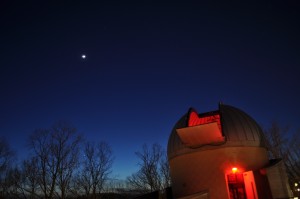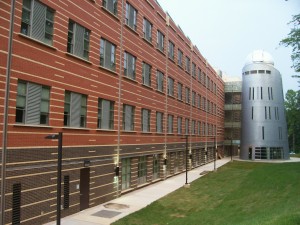“Considered by many to be the best meteor shower in the heavens, the Geminids are known for producing up to 60 multicolored meteors per hour at their peak. The peak of the shower is on December 13 & 14, although some meteors should be visible from December 6 – 19. This year, a nearly new moon will provide an excellent viewing experience in the early morning hours. The radiant point for this shower will be in the constellation Gemini. Best viewing is usually to the east after midnight.”
http://www.seasky.org/astronomy/astronomy_calendar_2009.html
This year’s Perseid shower occurs in dark, dark skies — just 3 days after the new moon. No doubt the best meteor shower event to stay up for in 2010. At the peak on August 12th, you can expect 100 meteors per hour.
http://www.wolframalpha.com/input/?i=Perseid+meteor+shower+2010
Thanks, Swift-Tuttle comet!
Not usually as spectacular as the Perseids (August) or Geminids (December) showers, but this year the two Big Showers happen very near the full moon. However, this Quadrantids shower will take place in the deep dark of the new moon — so this may in fact be the best shower in 2011.
From Wikipedia: “The peak intensity is exceedingly sharp: the meteor rates exceed one-half of their highest value for only about 8 hours (compared to two days for the August Perseids). This means that the stream of particles that produces this shower is narrow – and apparently deriving from and within the last 500-years from some orbiting body.”
Nicely timed as the peak happens during the new moon. The Lyrids meteor shower is active from the 16th Apr to 25th Apr with fewer activity either side of the peak time (Saturday night.)
Geminids
The final major meteor shower of every year (unless one surprises us!) is always the December Geminid shower, often producing 50 or more meteors per hour. It is a beloved shower, because, as a general rule, it’s either the August Perseids or the December Geminids that give us the most prolific display of the year. Best of all, the new moon guarantees a dark sky on the peak night of the Geminid shower (mid-evening December 13 until dawn December 14). But the nights on either side of the peak date should be good as well. Unlike many meteor showers, you can start watching the Geminids by 9 or 10 p.m. local time. The peak might be around 2 a.m. local time on these nights, because that’s when the shower’s radiant point is highest in the sky as seen around the world. With no moon to ruin the show, 2012 presents a most favorable year for watching the grand finale of the meteor showers. Best viewing of the Geminids will probably be from about 1 a.m. to 3 a.m. on December 14.

Dr. Michael Summers and Implications of Finding Alien Life in Research Hall Science Showcase. 1st talk at 6PM, same talk at 6:45PM, observing starts at 6;30PM until 8PM.
Campus Map – The George Mason University Observatory at the Fairfax Campus building Research Hall formerly known as Research I.

Manuela Dal Forno and The World of Lichens – Research Hall Science Showcase (especially recommended for kids). 1st talk at 6PM (weather permitting), same talk at 6:45PM (weather permitting), observing starts at 6:30PM until 8PM (weather permitting).
Campus Map – The George Mason University Observatory at the Fairfax Campus building Research Hall formerly known as Research I.
Tuesday 26 February 2013: This date IF AND ONLY IF 19 February 2013 canceled due to weather. 1st talk at 6PM, same talk at 6:45PM, observing starts at 6:30PM until 8PM.

THIS EVENT HAS BEEN CANCELLED DUE TO IMPENDING WEATHER
1st talk at 6PM (weather permitting), same talk at 6:45PM (weather permitting), observing starts at 6:30PM until 8PM (weather permitting).
Campus Map – The George Mason University Observatory at the Fairfax Campus building Research Hall formerly known as Research I.

1st talk at 7PM, same talk at 7:45PM, observing starts at 7:30PM until 9PM.
Campus Map – The George Mason University Observatory at the Fairfax Campus building Research Hall formerly known as Research I.
Tuesday 26 March 2013: This date IF AND ONLY IF 19 March 2013 canceled due to weather. 1st talk at 7PM, same talk at 7:45PM, observing starts at 7:30PM until 9PM.

1st talk at 7PM, same talk at 7:45PM, observing starts at 7:30PM until 9PM.
Campus Map – The George Mason University Observatory at the Fairfax Campus building Research Hall formerly known as Research I.
Tuesday 9 April 2013: This date IF AND ONLY IF 2 April 2013 canceled due to weather. 1st talk at 7PM, same talk at 7:45PM, observing starts at 7:30PM until 9PM.

